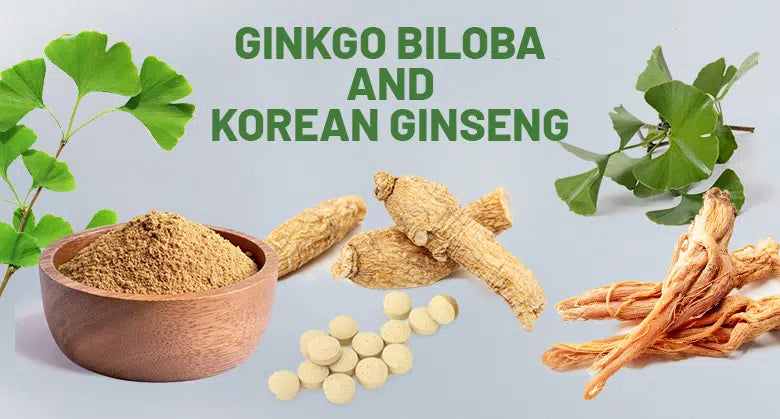Nature has gifted us with the best natural remedies available in the form of plants, flowers, and herbs to protect and heal the body naturally. Fortunately, the human species in ancient times—nearly 1000 years ago—discovered these plants with medicinal properties. One such discovery was the Ginkgo Biloba tree, which is native to China and has been widely grown since ancient times for its variety of health benefits. Gingko Biloba dates back more than a thousand years, and therefore it is termed a "living fossil''.
Some Interesting Facts about Gingko Biloba
- It appeared over 290 million years ago and is the last living species.
- It’s a large tree with fan-shaped leaves.
- The trees are used to add beauty to urban landscapes.
- These trees are considered a symbol of longevity as they can live for over a thousand years.
- Ginkgo's are often found in Buddhist monasteries, and the ginkgo leaf is nicknamed a fingernail of Buddha.
- Ginkgo biloba trees can grow up to 40 meters in height.
Which part of the ginkgo tree is used for its benefits?
Ginkgo Biloba leaf extract is used as a primary source in modern medicine. Numerous research studies have been carried out to date to determine the different types of health benefits of ginkgo, which is considered an important part of the natural medical system.
What are the benefits of Gingko Biloba:
Ginkgo biloba is used as a traditional herbal remedy to treat many health conditions. It was found that Ginkgo Biloba’s natural ability to increase blood flow to various parts of the body may be the reason for many of its supposed benefits.
1. Improved brain health and role in dementia and Alzheimer’s disease.
Several studies showed that ginkgo improved brain function and could have a protective role against dementia and Alzheimer's disease. It was observed that it slowed the progression of dementia symptoms, especially those that resulted from atherosclerotic vascular disease. Ginkgo biloba extract was found to stabilize and improve several measures of cognitive function and social functioning in patients with Alzheimer's disease and vascular or mixed dementia.
While some studies did not find a significant role for ginkgo biloba in the prevention and cure of dementia and Alzheimer's disease.
Ginkgo biloba therefore can be labeled as a promoter in the improvement of brain health. It can slow down the memory loss that is common in dementia. However, it is important to note that Gingko biloba cannot prevent or cure dementia and Alzheimer’s disease.
2. Cognitive function and mental performance
Ginkgo biloba extract supplements have become popular in recent years for the treatment of memory problems, lack of concentration, and reduced mental performance in adults.
Some research studies have found that the Ginkgo biloba plays a positive role in improving these areas through its antioxidant role and adequate blood supply to the brain. Currently, a lot of research is being carried out to support and confirm its significant role in cognitive and mental performance.
3. Vertigo
Ginkgo biloba supplementation has been observed to reduce the symptoms of vertigo. A study suggested that 47 percent of people taking Ginkgo recovered from vertigo symptoms after three months, compared with just 18 percent in the placebo group. This can be attributed to its role in improving blood circulation in the brain.
Therefore, Ginkgo biloba supplements can be taken to treat vertigo under a health practitioner's prescription.
4. Improves blood circulation and promotes heart health.
In one study, researchers found that people with heart disease who were supplemented with ginkgo had a spontaneous increase in blood flow to multiple parts of the body. The reason observed was that Ginkgo biloba promoted the rise of circulating nitric oxide by 12 percent, a compound responsible for dilating blood vessels. More research studies were conducted that proved the similar effect of ginkgo biloba on blood circulation.
5. Antioxidants
Researchers found that ginkgo biloba contains high levels of flavonoids and terpenoids. These plant compounds are known for their impressive antioxidant effects. The antioxidant property helps to fight free radicals that are produced during the metabolic processes, like the conversion of food to energy. The increase in levels of free radicals in the body can have a damaging effect on health, e.g., cancer.
6. Anxiety and depression
Gingko was traditionally believed to have good effects on improving mood and reducing anxiety and depression symptoms. Researchers began exploring the effects of ginkgo on anxiety, and one study in 2007 found that when 170 people with generalized anxiety were treated with 240 milligrams (mg) of ginkgo, 480 mg of ginkgo, and a placebo, the group treated with the 480 mg dose of ginkgo reported a 45% greater reduction in symptoms of anxiety compared to the subjects given 240mg and a placebo group.
It is believed that the anti-oxidant effect of ginkgo leads to a reduction in anxiety symptoms.
7. Vision and eye health.
Ginkgo Biloba has been found to have an impact on vision and eye health. This benefit of Gingko Biloba can be attributed to its property of increasing the blood flow within the body. The increased blood flow toward the eyes may contribute to better vision and good eye health. Research studies were carried out to find the role of Ginkobiloba in vision and eye health and found that the subjects reported an improvement in vision when given ginkgo extract. However, more research is required to prove its role and benefits in eye vision and eye impairment.
8. Sexual dysfunction
Gingko's significant role in increasing the blood flow by elevating nitric oxide can contribute to increasing blood flow to sexual organs and thereby reducing sexual dysfunction. Currently, researchers are carrying out studies to strongly prove Gingko’s role in sexual dysfunction.
Gingko Biloba in Men’s health
Researchers believe that ginkgo may improve erectile dysfunction specifically caused by antidepressant medications through the same mechanism by increasing the levels of nitric oxide and thereby increasing blood flow to the penis and related genital organs.
Gingko Biloba in Women's health
One study revealed that Ginkgo may help relieve premenstrual syndrome (PMS) symptoms. The study observed that participants taking Gingko experienced more relief and a reduction in premenstrual symptoms.
What are the side effects of Ginkgo Biloba?
Ginkgo Biloba in supplement form has rare side effects. It has been observed to be safe and can be used for up to six months. Though it is advisable that patients on blood thinners and NSAIDS like ibuprofen strictly avoid Ginkgo biloba as it can lead to severe bleeding. Similarly, patients with blood disorders should not be taking Ginkgo biloba, as it can exhibit severe side effects.
It should also be avoided by pregnant and breastfeeding women and children.
To understand the suitability of the supplement, it is advisable to take a Gingko Biloba supplement under a health practitioner's recommendation.
Ginkgo biloba is a registered herbal supplement in the United Kingdom. It is strictly recommended that Ginkgo biloba be taken in supplement or in a processed form and not in the form of direct raw seed or leaves, as it can be poisonous.
Is it safe to take Ginkgo biloba and Ginseng together?
Ginseng is the root of Panax plant and is used widely throughout the world as an herbal supplement. Researchers found a positive impact on memory and effectiveness in reducing the symptoms of Alzheimer's disease. It is believed that the effects of ginseng may be mediated through increases in antioxidant and BDNF levels in the brain.
The combination of Ginkgo biloba and Ginseng has shown impressive results in research studies. In one study, the combination showed that it significantly improved the index of memory quality.
Korean Ginseng has been found to be more effective in promoting positive cognitive effects.
It is therefore highly recommendable to have Ginkgo biloba in combination with Korean Ginseng to improve cognitive functions and mental performance in healthy adults.
When to take Ginkgo Biloba Ginseng complex - Morning or Night?
The best time to take Ginkgo biloba- Ginseng complex supplement in tablet form is during the day time, preferably in the morning with a meal, as it can help enhance cognitive effects like focus and mental performance throughout the day.
Conclusion
Considering both - the benefits and side effects of Ginkgo biloba in combination with Korean Ginseng in the form of a tablet can be supportive treatment along with the prescribed medication for various health conditions under health practitioners’ guidance.
Buy Now
Gingko Biloba- Korean Ginseng complex can be called a magic bullet in cognitive and mental performance in healthy adults!
